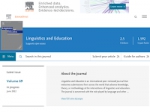
NEWS: Chatbots.org survey on 3000 US and UK consumers shows it is time for chatbot integration in customer service!read more..
Linguistics and Education: An International Research Journal
Summary: Linguistics and Education focuses on all areas of linguistics and the study of education.

Linguistics and Education encourages submissions that apply theory and method from all areas of linguistics to the study of education. Areas of linguistic study include, but are not limited to: text/corpus linguistics, sociolinguistics, functional grammar, discourse analysis, critical discourse analysis, conversational analysis, linguistic anthropology/ethnography, language acquisition, language socialization, narrative studies, gesture/ sign /visual forms of communication, cognitive linguistics, literacy studies, language policy, and language ideology. These linguistic traditions may be applied to a wide variety of educational contexts, ranging from classroom settings in conventional institutional contexts, to distance learning taking place over the internet or through videoconferencing, to tutoring/advising/counseling sessions, to less formal sites where structured teaching, learning or apprenticeship related to any kind of knowledge or practice (academic, physical, spiritual, social) takes place. Topics of interest include (but are not limited to): bi- and multilingual education, minority language education, second and foreign language teaching, literacy, gesture/multimodal communication, science/math teaching, cross and intercultural education, textual analysis of pedagogical materials, teacher education, code switching, collaborative/group learning, content-based learning, academic and other writing, dialects in education, teacher discourse, peer interaction, the use of computers and/or new media in education and digital literacies.
New Comment
Only registered members are allowed to comment. or login
or login
